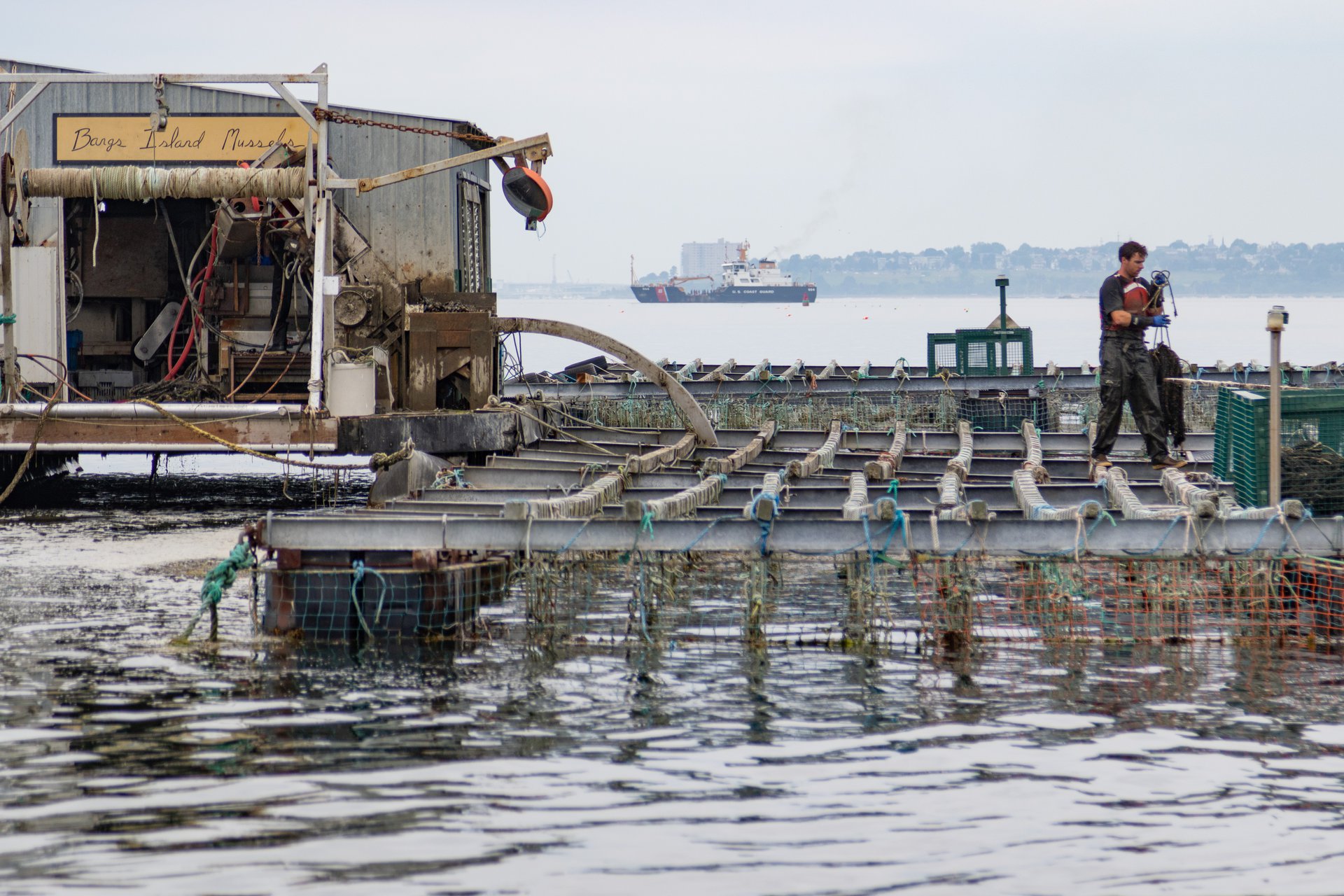New Report Highlights Aquaculture Workforce Need
Tidings | Sep 14, 2020
Maine's aquaculture industry is growing. Our new report highlights the projected workforce needs and identifies opportunities to meet them.

In July, we published a new report which identifies the labor needs of Maine’s growing aquaculture industry and charts a course for Maine to establish a comprehensive workforce training system.
The report — produced by the Gulf of Maine Research Institute aquaculture team in partnership with the Maine Aquaculture Association and Educate Maine, with support from FocusMaine — captures the findings of a collaborative project team that included local partners, industry voices, and a team of outside experts drawn from four Scottish consulting firms.
After extensive interviews with Maine aquaculture businesses, including established and prospective land-based operations, marine producers, service providers, and supply chain companies, the team is now sharing their findings across this rapidly-growing sector.
Gulf of Maine Research Institute Aquaculture Program Manager Chris Vonderweidt, who led the 18-month project, emphasized the importance of collaboration to the success of the project.
With so many businesses, NGOs, and individuals invested in the responsible growth of this industry, we knew this project needed to be a true collaboration. It’s crucial for all of us to understand what workforce development efforts are required to realize the potential for Maine’s coastal economy and working waterfronts — so it’s exciting to be able to provide some of those answers.”
Chris Vonderweidt Aquaculture Program Manager![]() Chris Vonderweidt Aquaculture Program Manager
Chris Vonderweidt Aquaculture Program Manager
Workforce Need
Maine’s aquaculture industry includes a constellation of largely owner-operator scale shellfish and marine algae farms, mid-sized service providers, and largescale finfish production operations. New production models, such as land-based Recirculating Aquaculture Systems provide yet another growing employment opportunity in this sector.
While the needs of these various business models are wide-ranging and variable, one common need emerged from the study: an expanded pool of well-trained workers.
Today, Maine’s total aquaculture workforce exceeds 600 direct employees, plus auxiliary services, further trades, transport, processing, equipment supply, and retail employment across the value chain.
Based on interviews with existing and prospective business owners, the industry will require an influx of new trained workers in the coming years. By 2022, the aquaculture workforce is projected to include around 880 employees across production and related activities, and over 1,600 across the supply chain. By 2030 the workforce could exceed 1,000 direct employees, and over 2,000 in the total production, supply chain and downstream markets.
Without a deliberate effort to train and develop these workers, Mainers may not realize the full economic benefit of this expanding industry.
“Finding workers with the right skills is a year-after-year challenge for Mook Sea Farm,” said Bill Mook, owner of Mook Sea Farm. “I’m impressed with the proposed system that is founded on industry needs and prioritizes the type of training and experience to produce employees that can enable our continued growth.”
Education and Training Opportunity:
After identifying the scale of the workforce need for Maine’s aquaculture industry, the report goes on to identify opportunities to meet these needs.
The report reveals the importance of practical know-how and on-the-job experience to nearly all the businesses participating in the interviews. Maine’s industry stakeholders believe on-the-job training is valuable — but they also expressed a desire for more programs structured to develop and formalize occupational competencies.
The report identifies Maine’s community colleges and career technical education centers as well-prepared to create learning opportunities that meets industry demand identified through the research.
The report specifically recommends the creation of three vocational hubs across the state to provide vocational training specific to aquaculture: Southern Maine Community College in South Portland, the Mid-Coast School of Technology in Rockland, and Washington County Community College in Calais.
“We are delighted about the opportunity to train and develop Maine students to expand our state and regional workforce in support of our vital waterfront industry,” said Washington County Community College President Susan Mingo.
“SMCC is well-positioned with our oceanfront location, a highly regarded Marine Science degree program and instructors who are experienced in aquaculture and business,” adds SMCC President Joe Cassidy. “We look forward to working with the Gulf of Maine Research Institute and people in the aquaculture industry to determine how we can best support this growing Maine industry.”
Among the other recommendations made within the report are a Maine Department of Labor-approved aquaculture apprenticeship program, the development of new occupational standards, and marketing support to promote the new learning opportunities.
Explore This Project
Dive deeper on aquaculture workforce development, including both the full Maine Aquaculture Workforce Development Strategy report and a Summary Report.



